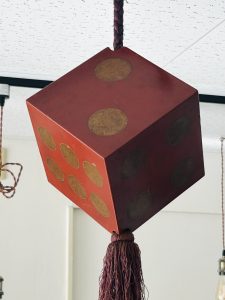現代病ともいわれる秋バテと筋肉のお話(愛知県名古屋市千種区姫池通 骨董買取 古美術風光舎)
2025.09.11

暑さのためうっかり忘れてしまいそうですが、もう9月に入っております。本日名古屋は曇り空で体もやっと一息つけそうです。
ふと気づいたのですが、真夏でさえ朝は食欲全開の私ですが、最近は朝起きた時にあまり食欲がありません。朝食を抜くという頭がないので、必死で胃に押し込んでいる状態です。豊漁で丸々とした秋刀魚やカツオ、巨峰や梨などの秋が旬の食べ物が店頭に並び、いつもなら食欲の秋の訪れにウキウキしているところですが、なぜか今年は気分も上がりません。
今夏の名古屋は35度を超える猛暑日が昨日までの観測で「50日」あったとのこと。最近は「秋バテ」を訴える人が増え、現代病ともいわれているそうです。長引く夏の疲れに季節の変わり目、台風などの気圧の変化なども加わり、自律神経が乱れるようです。私も夏バテは何とか乗り切ったものの、今は秋バテとなって体に現れている気がします。
自律神経が乱れる原因の一つに「変化」があるとのこと。夏は外の気温とエアコンが効いた室内を行き来し、さらにエアコンを使っても寝苦しく通常の睡眠を確保するのが難しくなり、脱水や冷たいものの飲みすぎ食べすぎで胃腸が疲れた結果、自律神経に負担がかかり夏バテとなります。
秋になると外気温の寒暖差が大きくなり、低気圧や台風などの気圧の上下が自律神経を乱し、日照時間が短くなることでセロトニン不足による睡眠障害が起こり、体がだるく食欲が湧かない秋バテとなります。
なんだか絶望的なことばかりなので何とかしたいところですが、「自律神経」という名の通り、自分の意思とは関係なく働くのでコントロールすることはできません。ご存知の通り自律神経には体と心が活発に働く、いわばアクセルの役目をする交感神経と、心拍数を下げ、リラックスした状態で胃腸の働きを良くするなどの役目を担う副交感神経が交代で優位に働きます。この二つの神経がバランスよく働くのが理想で、さらにどちらの神経の働きも高い状態で保たれていないといけません。
自律神経をコントロールできないのであれば少しでも体調を改善するにはどうすればいいのか?と調べてみますと、自律神経の乱れから疲れがたまっている時こそ無理をし過ぎない程度に「動く!」ことが大切なのだそうです。えっ、無理と思ったのは私だけでしょうか。
しかしこの「秋バテ」を何とかしなくてはと思い、最近は意識してエレベーターではなく階段を使うなど小さなことから始めています。
外出から帰ると疲れて一休みしたくなりますが、一旦副交感神経がオンになると交感神経に移ることはかなり難しくなるのだとか。ものすごく分かります。一休みしても山積みの家事からは逃げられず、何とか立ち上がったときの疲労感が半端ないのです。過酷ですが、家に帰ったら交感神経が働いているうちに用事を済ませる!…努力はしています。
筋トレに励む友人から聞いたのですが、筋肉には体を動かし始める時に使う「遅筋」と負荷が強まった時に使う「速筋」があるそうです。筋肉を使わないと「遅筋」が衰え、少しの動作でも負荷を感じるようになり、すぐに「速筋」を使い始めます。速筋を使うと乳酸が出やすくなりエネルギー不足に陥り、体は「これ以上動くと危険」と判断し、疲れを感じやすくして動かないようにさせるのだそうです。筋肉が少ないと生命維持のために動かないよう「疲れを感じさせる」ということでしょうか。空恐ろしいです。
さらに筋肉を使わない生活をしていると、「この人は獲物を捕れない人」と体が判断し、前もって筋肉を分解して栄養を作り始めるのだそうです。もちろん筋肉はさらにやせ細ります。なので、筋トレをしなさいという友人からの助言でありました。
そして、当然ながら自律神経のためには発酵食品や旬の食材など、バランスの良い食事も必要となります。ただし本当に食欲が湧かないときは、「無理に食べない」というのもアリなのだそうです。何かと便利になった現代社会では昔ほど体を動かす必要がなく、胃を休ませるためにも一食くらいなら「食べない」という選択肢もあるのだとか。
食欲のない朝でも無理に食べていましたが、この飽食の時代、確かに私は必要以上に食べすぎているのかもしれません。少し考えを改めました。なんとか秋バテから脱出したい!
それでは、また次の機会に。(スタッフH)
It’s easy to forget with this heat, but we’re already into September. Today in Nagoya, the cloudy skies finally give my body a chance to catch its breath.
I suddenly realized something: even in the height of summer, I have a ravenous appetite in the morning, but lately, I wake up with no appetite at all. Since skipping breakfast isn’t an option for me, I’m desperately trying to force food down. The shops are lined with delicious autumn seasonal foods like plump, fresh-caught Pacific saury and bonito, Kyoho grapes, and pears. Normally, I’d be excited about the arrival of autumn, the season of appetite, but for some reason, I just can’t get into the mood this year.
This summer in Nagoya, the number of scorching days exceeding 35°C (95°F) reached “50 days” as of yesterday. Recently, more people are complaining about “autumn fatigue,” a weather-related illness now considered a modern ailment. Factors like summer exhaustion, seasonal transitions, and typhoon-induced atmospheric pressure changes seem to disrupt the autonomic nervous system. While I managed to get through summer fatigue, I feel like autumn fatigue is now manifesting in my body.
One cause of autonomic nervous system disruption is “change.” In summer, moving between hot outdoor temperatures and air-conditioned indoor spaces, plus struggling to sleep comfortably even with AC, makes getting normal sleep difficult. Dehydration and overindulging in cold drinks and food tire the digestive system, putting strain on the autonomic nervous system and leading to summer fatigue.
In autumn, the greater temperature fluctuations between indoors and out, along with changes in atmospheric pressure from low-pressure systems and typhoons, disrupt the autonomic nervous system. Shorter daylight hours lead to sleep disorders caused by serotonin deficiency, resulting in autumn fatigue characterized by lethargy and loss of appetite.
It all sounds rather hopeless, and I want to find a way to manage it. However, as the name “autonomic nervous system” suggests, it functions independently of our conscious will and cannot be controlled. As you know, the autonomic nervous system alternates between dominance of the sympathetic nervous system—which activates the body and mind, acting like an accelerator—and the parasympathetic nervous system—which lowers heart rate, promotes relaxation, and improves gastrointestinal function. Ideally, these two systems work in balanced harmony, and both must be maintained at a high level of functionality.
If we can’t control the autonomic nervous system, how can we improve our condition even slightly? Upon looking into this, it seems that when fatigue builds up due to autonomic imbalance, it’s crucial to “move!”—within reason, without overdoing it. Huh? Am I the only one who thought that sounded impossible? But determined to tackle this “autumn fatigue,” I’ve recently been consciously making small changes, like taking the stairs instead of the elevator.
When I get home from going out, I feel exhausted and just want to rest. But apparently, once the parasympathetic nervous system kicks in, it becomes really hard to switch back to the sympathetic one. I totally get that. Seeing all the things I need to do just adds more stress, and the fatigue when I finally manage to get up is insane. It’s brutal, but I’m trying to tackle chores while my sympathetic nervous system is still active after getting home!… I’m trying.
A friend who’s into weight training told me there are two types of muscle fibers: “slow-twitch” used when starting movement, and “fast-twitch” used when the load increases. If you don’t use your muscles, the slow-twitch fibers weaken. Then even minor movements feel like a load, forcing you to start using fast-twitch fibers sooner. Using fast-twitch fibers makes you produce lactic acid more easily, leading to energy depletion. The body then judges “moving more is dangerous,” making you feel tired and discouraging further movement. Does this mean that if you have little muscle, your body makes you feel tired to prevent movement for survival? That’s terrifying.
Furthermore, if you lead a life where you don’t use your muscles, your brain apparently judges that “this person can’t catch prey” and starts breaking down muscle tissue in advance to create nutrients. Naturally, your muscles become even more emaciated. That’s why my friend advised me to do strength training.
And for the autonomic nervous system, a balanced diet is also fundamental. Eating foods good for autumn fatigue, like fermented foods and seasonal ingredients, is also important. However, when you genuinely have no appetite, it’s apparently okay not to force yourself to eat. In our modern, convenient society, we don’t need to move our bodies as much as in the past, so choosing not to eat can also give your stomach a rest.
I used to force myself to eat even on mornings with no appetite. But in this age of abundance, I might indeed be eating more than I need. I’ve reconsidered my approach a bit.
Well then, until next time. (Staff H)
*******************
ご実家の整理やお片付けなどをされている方のご相談などが多くございます。
お片付けなどくれぐれもご無理のないようになさってくださいませ。
風光舎では古美術品や骨董品の他にも絵画や宝石、趣味のお品など様々なジャンルのものを買受しております。
お片付けをされていて、こういうものでもいいのかしらと迷われているものでも、どうぞお気軽にご相談下さいませ。
また風光舎は、出張買取も強化しております。ご近所はもちろん、愛知県内、岐阜県、三重県その他の県へも出張いたします。
まずは、お電話お待ちしております。
愛知県名古屋市千種区姫池通
骨董 買取【古美術 風光舎 名古屋店】
TEL052(734)8444
10:00-17:00 OPEN
#出張買取#骨董#古美術#骨董品#絵画#版画#茶道具#刀剣#彫刻

